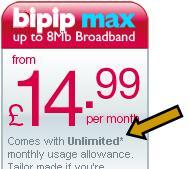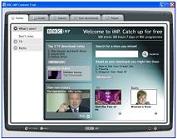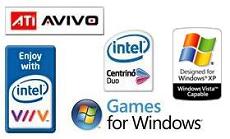|
 Unlimited broadband/Internet* Unlimited broadband/Internet*
Most ISPs (Internet Service Providers) now restrict the amount of data that can be downloaded, even on so-called unlimited packages. They usually have a tiny asterisk (*) directing you to the small print which points out the real limit, which in the ISPís opinion, no normal person should exceed. Hardly unlimited then! This scam has now found its way onto mobile phone data contracts, where in most cases unlimited does not actually mean unlimited.
Packet shaping
As the number of broadband users increases and they in turn demand more and more speed, the current UK broadband infrastructure unfortunately cannot cope and as a result needs to apply some restrictions. This may include the use of packet shaping which means that for certain on-line activities you will not get anywhere near your theoretical broadband speed. You may have an 8Mb/sec connection (which in reality is probably closer to 5Mb/sec) but you may be restricted to downloading files such as Windows updates or game demos at only 256Kb/sec. In other words 32 times slower than you might have expected. This little detail is generally very well hidden by the ISPs and is now commonplace, especially with high-speed connections.
Fair Usage Policy
More broadband policing, this time largely targeted at the main bandwidth users, in other words, the people who download a lot. If they misbehave then their ISP cuts them off, three strikes and youíre out. Now that weíre all downloading lots of data using BBC iPlayer primarily, this is putting large demands on the broadband infrastructure. So will we all be looking for new ISPs soon, having breached our ISPís Fair Usage Policy?
Phishing
A form of identity theft that happens when you are fooled into entering private details on a fake website that appears identical to the real one. The con usually starts with an email that pretends to be from a bank or other source asking you to check your online details. The email contains a link to the fake website which you can click on, or hopefully ignore. So how can you protect yourself. Well, for a start most banks (and other companies) now donít send such emails. Newer versions of Internet Explorer and Firefox have anti-phishing measures built-in but the only real protection is a bit of common sense. Luckily, most of these cons are perpetrated by people with a poor grasp of spelling and grammar so can be easy to spot.
Script Kiddies
As a home or small business user you might have to worry more about these particular urchins than your regular hacker. Hackers will generally go after the big companies or governments, someone with either lots of computers or money. Script Kiddies, as the name implies, are usually young people who simply download the tools the hackers create and then cause havoc to impress their mates. Their actions are fairly random and unpredictable. However, if they are equipped with a directional wireless network antenna, with a range of over one mile, they can cause chaos to any insecure wireless network in their neighbourhood all from the comfort of their own bedroom. You have been warned!
Dead/stuck pixels
These are manufacturing defects in LCD screens which appear as unchanging bright (stuck) or dark (dead) dots on the screen. These can be distracting and generally cannot be repaired (Search on Wikipedia for repair techniques and programs, but I have never had any success with these). Be careful, some manufacturers state that a screen with several dead-pixels will still be within manufacturing tolerances and therefore will not be replaced. Others guarantee their screens to be dead-pixel free. If buying an LCD monitor or laptop from a store try to test the screen before leaving the shop. If buying over the internet, you always have the option to return any goods within 7 days under the Distance Selling Regulations, but you may have to pay the courier costs. It might be better trying to establish the sellerís policy on dead-pixels before purchasing.
Voice Over IP (VOIP)
Anyone with friends and relatives overseas will have discovered this years ago as they can speak to them virtually free, provided they too have access to a computer on the internet. It is possible to use VOIP applications like Skype (which is free) to dial real telephone numbers, instead of computers, but the quality of these calls tends to be pretty poor. So it is advisable to buy a high quality headset if you intend to use VOIP a lot.
RAID
This is a way of combining two or more disk drives to give you faster performance and/or better data reliability. A few years ago these features would only have been found on expensive servers but are now commonplace on most motherboards. Strangely, RAID disks are almost non-existent in mainstream PC sales, maybe suppliers fear they might scare off customers.
Marketing stickers
Many PC and related products are usually covered with colourful stickers, like these. Asking a salesperson what the stickers mean will result in you receiving a three minute marketing spiel and youíll be none the wiser. Youíre much better off telling them why you want a PC and what you intend doing with it. If the salesperson nevertheless reels-off the marketing spiel, tell them to behave!
|